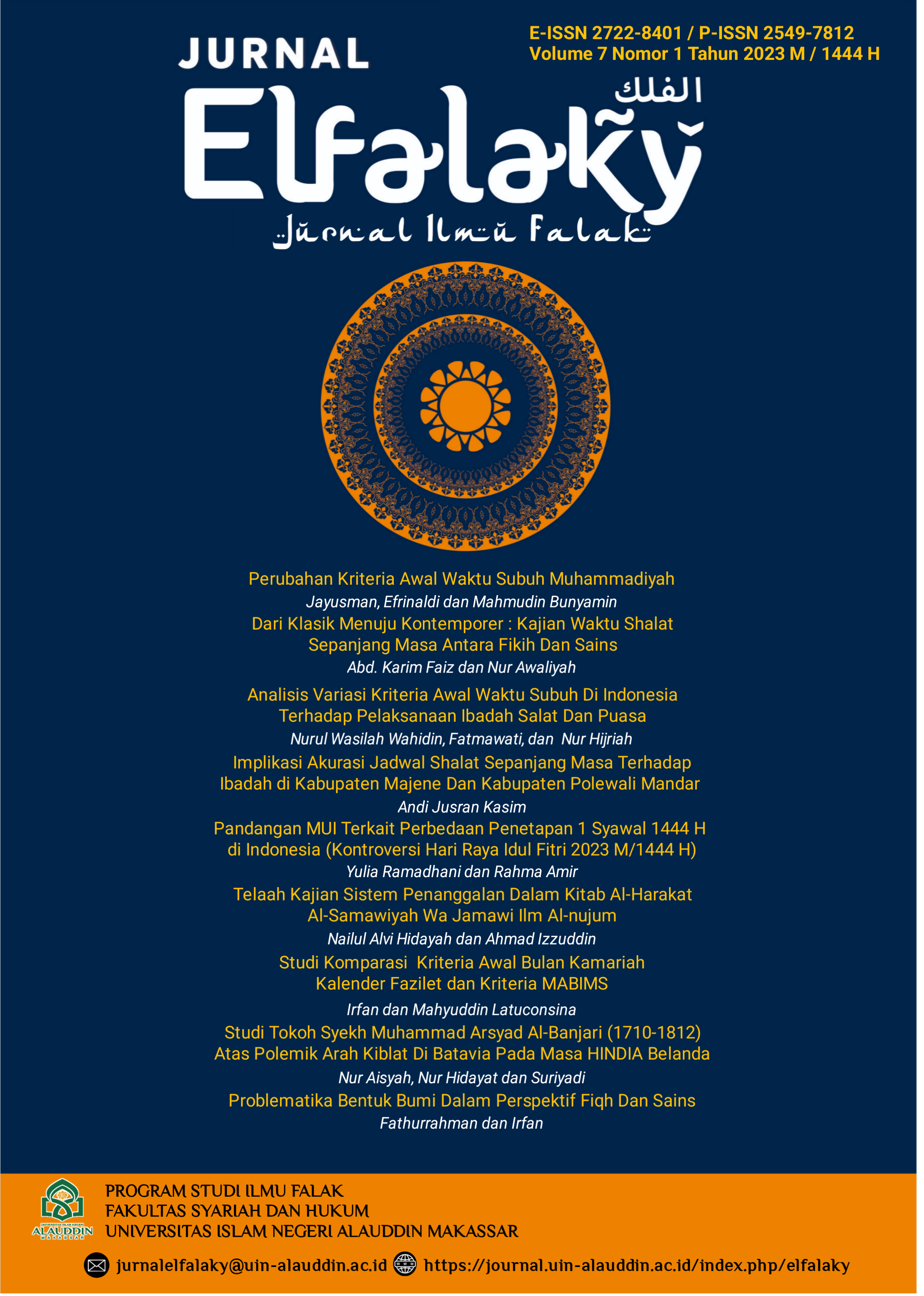FROM CLASSICAL TO CONTEMPORARY: A STUDY OF PRAYER TIMES FOR ALL TIME BETWEEN FIQH AND SCIENCE
Abstract
One of the reasons for the variation in prayer times is the difference in the methods used in making prayer time schedules. Differences in prayer times also occur in the city of Parepare, as happened between the two large mosques in the city of Parepare, namely the Grand Mosque and the Al-Azhar Islamic Center Mosque. Based on the observations of researchers on September 20, 2022 the prayer times for the two mosques are different, for example the time for the Maghrib prayer at the Grand Mosque is 17.59 WITA and the Al-Azhar Islamic Center Mosque is 18.01 WITA. This difference is due to the method used by the Great Mosque, namely the Prayer Times of all time and the Al-Azhar Islamic Center Mosque with Contemporary Hisab Ephemeris. The researcher is then interested in studying how the method of determining the reckoning of prayer times of all time and how accurate of reckoning of prayer times of all time is the Great Mosque of Parepare City from a contemporary reckoning perspective. The method used in this research is field research method to examine the beginning of the time of prayer at the Great Mosque of Parepare City. This research aims to describe the method of prayer time throughout the period of the Great Mosque of Parepare City and to analyse the accuracy of hisab prayer time throughout the period of Parepare City from the perspective of contemporary hisab. The results showed that the prayer time of the Great Mosque of Parepare City is a few minutes faster when compared to contemporary hisab.
References
Amirudin, Abdul Majid, and Ahmad Junaidi, ‘Analisis Metode Hisab Kontemporer Terhadap Jam Istiwa’’, Jurnal Antologi Hukum, 1.2 (2021), 97–116
Amri, Tamhid, ‘Waktu Shalat Perspektif Syar ‘I’, Asy-Syari’ah, 17.1 (2015)
Ardliansyah, Moelki Fahmi, ‘Implementasi Titik Koordinat Tengah Kota Dan Kabupaten Dalam Perhitungan Jadwal Waktu Solat’ (Tesis Pascasarjana UIN Walisongo Semarang, 2017)
Arman, Nuraliyah, ‘Analisis Hisab Kontemporer Tentang Awal Waktu Shalat Di Kota Parepare’ (IAIN Parepare, 2020)
Asrini, Asrini, ‘Studi Komparatif Hisab Kontemporer Ephemeris Dan Algoritma’ (Universitas Islam Negeri Alauddin Makassar, 2021)
Bahar, Asrini, ‘STUDI KOMPARATI HISAB KONTEMPORER EPHEMERIS DAN ALGORITMA’, HISABUNA: Jurnal Ilmu Falak, 2.2 (2021), 48–72
Bashori, Muhammad Hadi, Pengantar Ilmu Falak: Pedoman Lengkap Tentang Teori Dan Praktik Hisab, Arah Kiblat, Waktu Salat, Awal Bulan Qamariah & Gerhana (Pustaka Al Kautsar, 2015)
Butar-butar, Arwin Juli Rakhmadi, ‘Pengantar Ilmu Falak: Teori, Praktik Dan Fikih/Arwin Juli Rakhmadi Butar-Butar’, 2018
Butar-Butar, Arwin Juli Rakhmadi, ‘Historiografi Ilmu Falak Di Nusantara: Sejarah, Motivasi Dan Tokoh Awal’, Journal of Contemporary Islam and Muslim Societies, 2.2 (2019), 156–73
———, Mengenal Karya-Karya Ilmu Falak Nusantara; Transmisi, Anotasi, Biografi (LKiS Pelangi Aksara, 2017)
———, Warisan Ilmu Falak Sayyid Usman (w. 1331 H/1913 M) (umsu press, 2021)
Fahmi, Moch Riza, ‘Studi Komparasi Jadwal Salat Sepanjang Masa H. Bdurrani Mahmud Dengan Hisab Kontemporer’, Jurnal Bimas Islam, 10.3 (2017), 565–90
Faiz, A B D Karim, ‘Fiqh Moderation on Qibla Direction Determination: Flexible Accuracy’, JIL: Journal of Islamic Law, 1.1 (2020), 83–99
Faiz, Abd Karim, and Agus Muchsin, ‘Studi Waktu Dhuha Dalam Prespektif Fiqih Dan Hisab Ilmu Falak’, DIKTUM: Jurnal Syariah Dan Hukum, 18.2 (2020), 269–82
Hidayat, Rahmat, ‘Rukyat Hisab Waktu Salat’, 2021
di Indonesia, Jadwal Salat Sepanjang Masa, ‘Jadwal Salat Sepanjang Masa Di Indonesia (Studi Akurasi Dan Batas Perbedaan Lintang Dalam Konversi Jadwal Salat)’
Izzudin, Ahmad, Ilmu Falak Praktis (Pustaka Rizki Putra, 2020)
Jamil, A, Ilmu Falak (Teori Dan Aplikasi) Edisi Revisi (Amzah, 2022)
Jamil, Abdul, ‘Ilmu Falak (Teori Dan Aplikasi): Arah Qiblat, Awal Waktu, Dan Awal Tahun (Hisab Kontemporer)’, 2011
Kurniawan, Taufiqurrahman, ‘Ilmu Falak Dan Tinjauan Matlak Global’ (MPKSDI Yogyakarta, 2010)
Marpaung, Watni, Pengantar Ilmu Falak (Prenada Media, 2015)
Mubit, Rizal, ‘Formulasi Waktu Salat Perspektif Fikih Dan Sains’, Al-Marshad: Jurnal Astronomi Islam Dan Ilmu-Ilmu Berkaitan, 3.2 (2017)
Mustaqim, Riza Afrian, Ilmu Falak (Syiah Kuala University Press, 2021)
———, ‘RELEVANSI JADWAL WAKTU SALAT SEPANJANG MASA’, Jurnal Alwatzikhoebillah: Kajian Islam, Pendidikan, Ekonomi, Humaniora, 6.2 (2020), 22–34
Nurhalizah, Nurhalizah, ‘Penentuan Awal Waktu Salat Wajib Di Kota Sengkang Dengan Menggunakan Metode Klasik Dan Metode Kontemporer’ (Universitas Islam Negeri Alauddin Makassar, 2020), p. 14
Syarif, Muh. Rasywan. Ilmu Falak Integrasi Agama dan Sains. Cet.I; Gowa: Alauddin University Press, 2020.
Siregar, Mustamar Iqbal, ‘Reevaluasi Kriteria Perhitungan Awal Waktu Salat Di Indonesia’, At-Tafkir, 10.1 (2017), 38–63
Suleman, Frangky, ‘Penentuan Awal Waktu Shalat’, Jurnal Ilmiah Al-Syir’ah, 9.2 (2016)
Tanjung, Dhiauddin, Ilmu Falak: Kajian Akurasi Arah Kiblat Kota Medan, Metode Dan Solusi (Perdana Publishing, 2018)
Ulum, Fathul, ‘Studi Komparatif Hisab Penentuan Awal Waktu Shalat Dalam Kitab Al-Durusul Al-Falakiyah Dan Ephemeris’ (IAIN Ponorogo, 2020)





